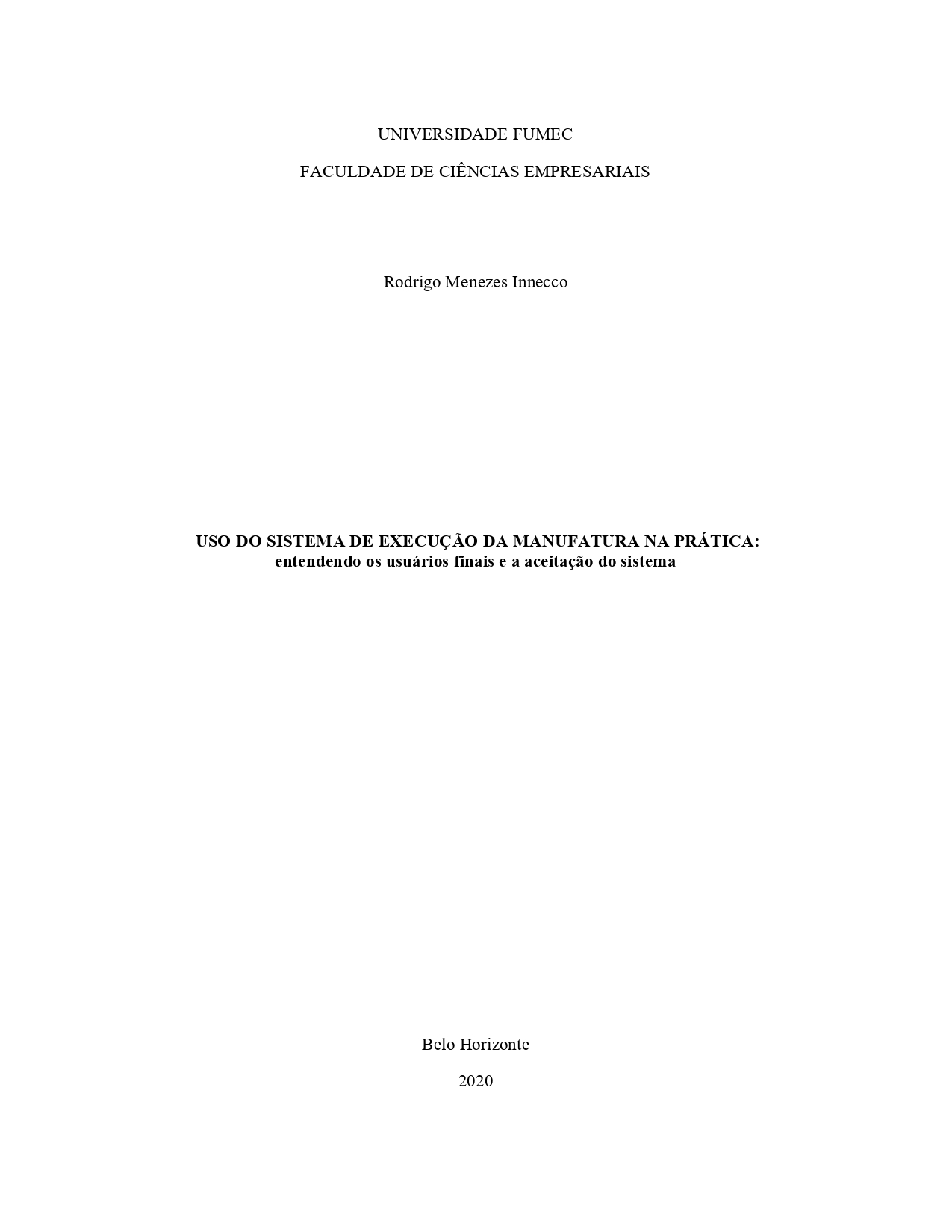Uso do sistema de execução da manufatura na prática: entendendo os usuários finais e a aceitação do sistema

Visualizar/
Data
2020Autor
Innecco, Rodrigo Menezes
xmlui.mirage2.itemSummaryView.MetaData
Mostrar registro completoResumo
O Sistema de Execução da Manufatura (MES) é uma tecnologia que pertence à
disciplina científica dos sistemas de informação. Em palavras simples, o MES preenche
a lacuna entre os sistemas de Planejamento de Recursos Empresariais (ERP) e os
sistemas de automação utilizados nos processos de manufatura. Com o crescimento
onipresente do investimento em sistemas de informação, a implementação de sistemas
cresce fortemente. No entanto, o sucesso da implementação de muitos sistemas
permanece na perspectiva técnica. A aceitação do sistema de informação pelos usuários
é a chave para a sua implementação e efetiva utilização. O objetivo geral do estudo
consiste em analisar quais fatores afetam a aceitação e o uso do sistema de execução de
manufatura na visão dos usuários finais, utilizando o modelo UTAUT. O estudo adotou
a abordagem quantitativa, pela técnica de Modelagem de Equações Estruturais, com uso
do software SPSS V.25. Foram coletados 121 questionários, restando 120 pela exclusão
de um por padrão de respostas suspeitas, em uma empresa multinacional do segmento
automobilístico. Os achados desse estudo, num contexto geral, demonstraram que as
Condições Facilitadoras influenciam o Comportamento de Uso dos usuários do MES. A
aplicação da análise de comparação multigrupos (MGA) demonstrou que a Expectativa
de Esforço influencia positivamente a Intenção Comportamental do grupo de usuários
Jovens do módulo Quality e a Influência Social também afeta positivamente a Intenção
Comportamental do grupo de usuários jovens, com baixa experiência e do módulo
Quality. The Manufacturing Execution System (MES) is a technology that belongs to the
scientific discipline of information systems. In simple words, MES bridges the gap
between the Enterprise Resource Planning (ERP) systems and the automation systems
used in manufacturing processes. With the ubiquitous growth of investment in
information systems, the implementation of systems grows strongly. However, the
successful implementation of many systems remains in the technical perspective. The
acceptance of the information system by users is the key to its implementation and
effective use. The general objective of the study is to analyze which factors affect the
acceptance and use of the manufacturing execution system in the view of end users,
using the UTAUT model. The study adopted the quantitative approach, using the
Structural Equation Modeling technique, using the SPSS V.25 software. 121
questionnaires were collected, remaining 120 for the exclusion of one by default of
suspicious answers, in a multinational company in the automobile segment and the
findings of this study, in a general context, demonstrated that the Facilitating Conditions
influence the Use Behavior of MES users. The application of multigroup comparison
analysis (MGA) demonstrated that the Expectation of Effort positively influences the
Behavioral Intention of the group of Young users in the Quality module and Social
Influence also positively affects the Behavioral Intention of the group of young users,
with low experience and Quality module.
